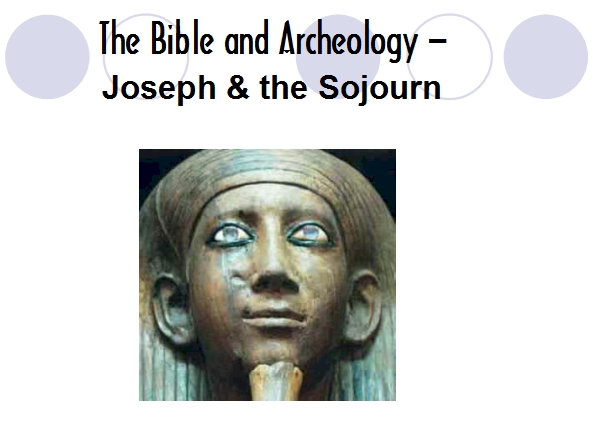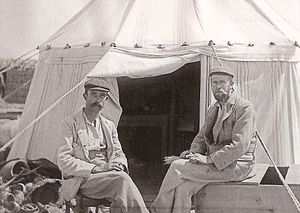|
DPS Biblical
Archeology Study Outline
6. Joseph & the Sojourn
|

Download: Teacher's Script: (PDF)
(Word) |
Handout: (PDF) (Word) |
PowerPoint
Overview
a. Inscriptions and Writings:
The Oxyrhynchus Papyri
b. Significance of the Sojourn in Egypt
Discussion Questions
a. The Oxyrhynchus Papyri
 Oxyrhynchus
is a city in Upper Egypt, located about 160 km south-southwest of Cairo,
in the governorate of Al Minya. It is also an archaeological site,
considered one of the most important ever discovered. For the past
century, the area around Oxyrhynchus has been continually excavated,
yielding an enormous collection of papyrus texts dating from the time of
the Ptolemaic and Roman periods of Egyptian history. Among the texts
discovered at Oxyrhynchus was the first New Testament papyrus (P1), on
only the second day of excavation, in the winter of 1896–7. Oxyrhynchus
is a city in Upper Egypt, located about 160 km south-southwest of Cairo,
in the governorate of Al Minya. It is also an archaeological site,
considered one of the most important ever discovered. For the past
century, the area around Oxyrhynchus has been continually excavated,
yielding an enormous collection of papyrus texts dating from the time of
the Ptolemaic and Roman periods of Egyptian history. Among the texts
discovered at Oxyrhynchus was the first New Testament papyrus (P1), on
only the second day of excavation, in the winter of 1896–7.
The Oxyrhynchus papyri have provided the most numerous sub-group of the
earliest copies of the New Testament. These are surviving portions of
codices (books) written in Greek uncial (capital) letters on papyrus.
The first of these were excavated by Bernard Pyne Grenfell and Arthur
Surridge Hunt in Oxyrhynchus Egypt, over the turn of the 20th century.
Of the 118 registered New Testament papyri, 44 (37%) are from
Oxyrhynchus. The earliest of the papyri are dated to the middle of the
second century, so were copied within about a century of the writing of
the original New Testament documents.
Since the 1930s, work on the papyri has continued. For the past twenty
years, it has been under the supervision of Professor Peter Parsons of
Oxford. Seventy one large volumes of the Oxyrhynchus Papyri have been
published, and these have become an essential reference work for the
study of Egypt between the 4th century BC and the 7th century AD. They
are also extremely important for the history of the early Christian
Church, since many Christian documents have been found at Oxyrhynchus in
far earlier versions than those known elsewhere. At least another forty
volumes are anticipated.
b. Significance of the Sojourn in Egypt
|
1915 B.C. – Birth of Joseph.
1898 B.C. – Joseph sold into Egypt.
1885 B.C. – Joseph exalted.
1876 B.C. – Israel enters Egypt.
1446 B.C. – The Exodus. |
Jacob demonstrated that Joseph was his favorite son and heir to the
double-portion inheritance by awarding him a “coat with sleeves.” This
was the sign of one who was to be the leader of the clan.
1.
Sold into Egypt.
The hatred of the brothers had its climax in a murderous plot which
ended only when Joseph had been sold to some passing slavers. Joseph
found himself being sold to an official of Egypt. (Genesis 37:36).
2.
Egypt in the Days of Joseph.
Joseph entered Egypt in the days of the Middle Kingdom. Pharaoh
Amenemhat II was upon the throne of both Upper and Lower Egypt.
Egypt during this period was ruled by a strong, centralized government.
The pharaohs of this period had their power held somewhat in check by
the individual governors.
Mines in the Sinai and in Ethiopia brought precious metals and ivory to
the courts of the pharaoh and a line of military fortresses were
established around the borders of Egypt to protect from outside
invaders. Just prior to Joseph entering Egypt, the capital was moved
from Thebes to lth-tawi, near the Delta.
3.
Joseph’s Imprisonment.
For a time, Joseph prospered in the house of Potiphar. This time of
prosperity was brought to a close in the attempted seduction by
Potiphar’s wife. When Joseph rebuffed her, she falsely accused him of
attempted rape.
Joseph was taken and thrown into the royal prison where political
prisoners were held. It was there that he befriended the pharaoh’s
butler. This friendship, along with a God-given gift of interpreting
dreams, would result in Joseph’s promotion to the Court of Pharaoh.
4.
Joseph’s Exaltation.
In
a single day, Joseph found himself propelled up to the position of
Viceroy over all Egypt, second only to the Pharaoh. Joseph’s economic
plan called for him to store up grain and food supplies for a coming
time of famine. When that time came, Joseph was able to heighten the
Pharaoh’s political hold over the nobility and the landowners of Egypt
by allowing the people to sell all of their lands to him in return for
food. From this time on, Egypt became a virtual feudal state with the
Pharaoh owning the land and allowing the people to work it and keep 80%
of the profit.
5.
Israel’s Entrance into Egypt.
The immediate reason for Israel’s entrance into Egypt was because of the
famine; but there were some underlying reasons. God’s plan and purpose
for Israel was to develop its own faith traditions and theology based on
their experience of and revelation by God
In Joseph do we find someone within that generation who
demonstrates a sense of patriotism, purpose and faith.
Because
of the draught, the patriarchal family system relocates from
Canaan to Egypt. Why Egypt? Aside from the obvious fact that Egypt was
the breadbasket of the world, there was a very significant reason for
Egypt to be the host-mother of Israel.
The Canaanites followed a policy of integration. They were constantly
seeking to intermarry and form family alliances with those around them
(Genesis 19:14, 26:10; 26:34; 27:46; 34:8-103). This would likely have resulted
in the merging of the Jewish traditions before they had taken a
hold on the people.
The Egyptians, on the other hand, were extremely strict segregationists
(Genesis 43:32; 46:34).
Thus the Israelites in Egypt would have no choice but to remain a
separated people group as God prepared them in Egypt. Four hundred years
later, this group of people emerged as a fledgling nation with a very
unique and defined theology and religious traditions.
Discussion Questions:
1. What moral lessons can we learn from the story of Joseph? How can the
story of Joseph encourage us in our own faith?
2. Theologians have drawn parallels between Joseph and Jesus. If you
think about that, can you identify any of those parallels? How does that
change the meaning of the story for you?
3. God led Israel through Egypt so their faith would be strengthened and
preserved for all future generations (see handout page 2). Was there a
time in your life when you realized that God had led you through a hard
journey only to strengthen your faith or to protect you from something
potentially worse? Did God ever use a tragedy for something good in your
life?
|